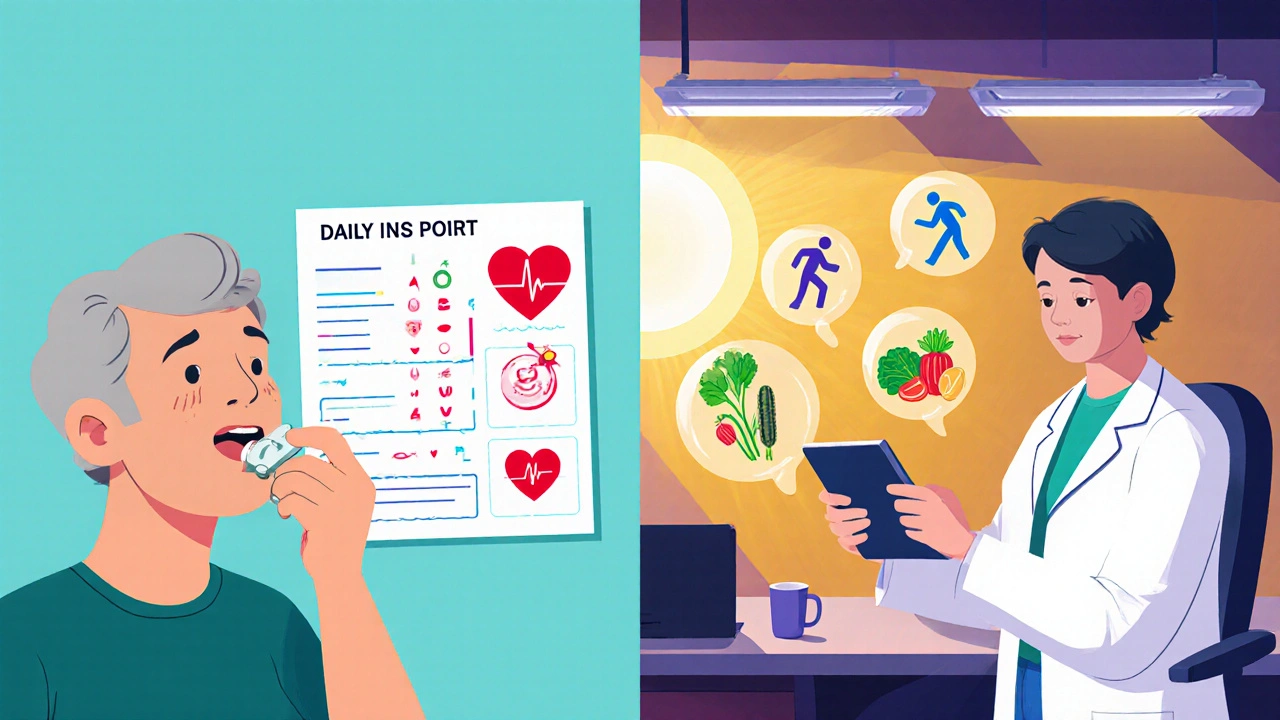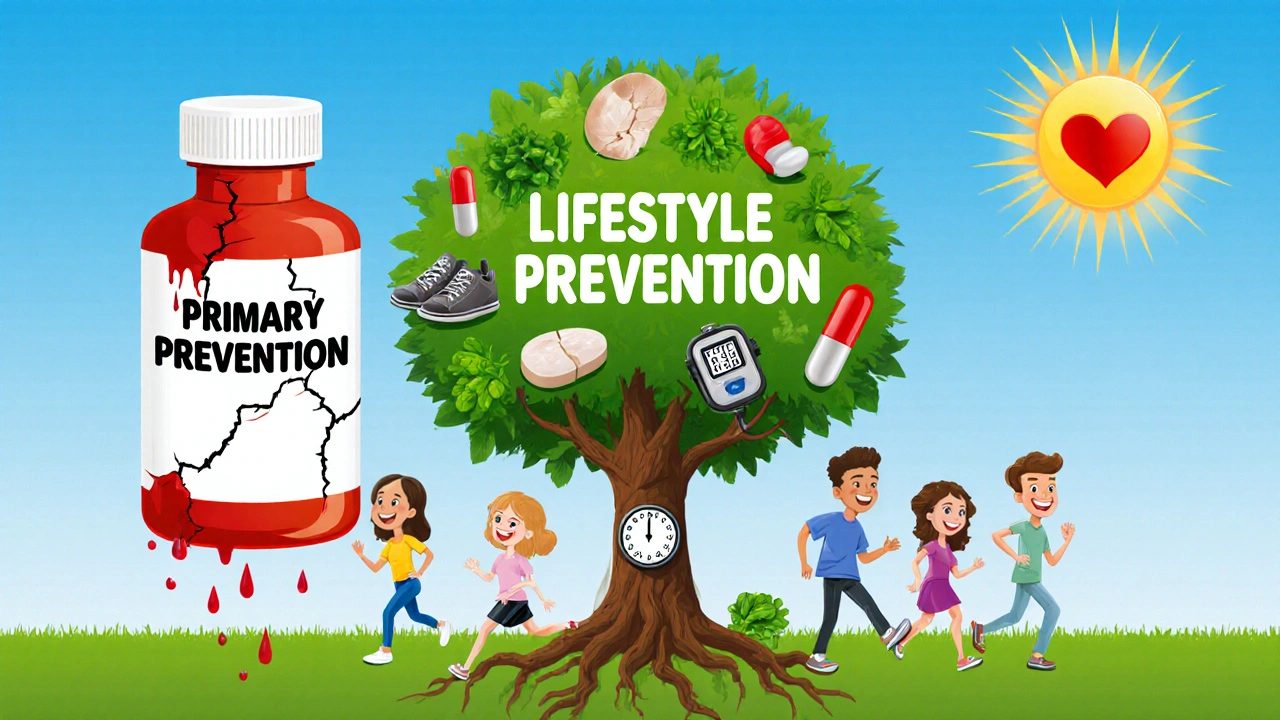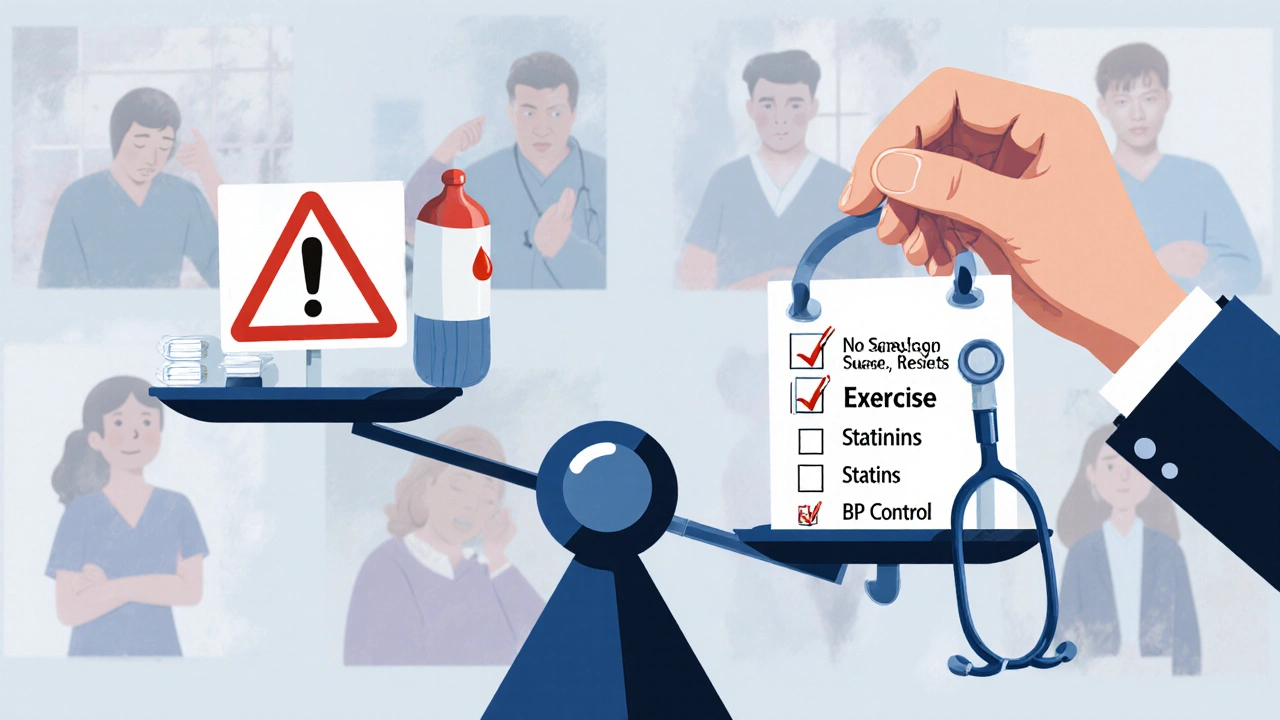
For decades, taking a daily low-dose aspirin was as common as brushing your teeth if you wanted to avoid a heart attack. Millions of people did it-especially if their parents had heart disease. But today, that advice has flipped. If you’re over 60 and have never had a heart attack or stroke, aspirin therapy is no longer recommended for prevention. Not because it doesn’t work, but because the risks now often outweigh the benefits.
The science behind this shift is clear. A major review by the U.S. Preventive Services Task Force in 2022, backed by data from over 130,000 people, showed that while aspirin slightly lowers the chance of a nonfatal heart attack or stroke, it increases your risk of serious bleeding-like stomach bleeds or brain hemorrhages-by 43%. For most healthy adults, that’s not a good trade-off.
Aspirin, first synthesized in 1899, blocks an enzyme called COX-1. That enzyme helps platelets stick together and form clots. In someone with clogged arteries, a clot can trigger a heart attack or stroke. By thinning the blood slightly, aspirin reduces that risk.
For people who’ve already had a heart attack, stroke, or stent placed, aspirin is still a lifesaver. In secondary prevention, it cuts the risk of another event by about 21%. But for people without any history of heart disease-primary prevention-the numbers don’t add up.
Modern medicine has changed too. Today, we have powerful statins that lower cholesterol by 30-40%, blood pressure meds that keep systolic pressure under control, and better diabetes management. These reduce heart disease risk far more effectively than aspirin ever did. As one cardiologist put it: “We’re not living in the 1990s anymore. We have better tools.”
The new guidelines don’t say “never.” They say “think carefully.”
For adults aged 40 to 59 with a 10% or higher 10-year risk of heart disease, aspirin might be considered. But only if:
How do you know your 10-year risk? Doctors use the ACC/AHA Pooled Cohort Equation. It asks for your age, sex, race, total cholesterol, HDL, systolic blood pressure, diabetes status, and smoking history. If you’re a 52-year-old man with high LDL, untreated hypertension, and you smoke, your risk might be 15%. That’s a candidate for discussion.
There’s one exception: people with type 2 diabetes and no prior heart disease. The American Diabetes Association still says aspirin might help if they’re over 40 and have at least one other risk factor-like high blood pressure or smoking. But even here, the recommendation is cautious.

If you’re 60 or older and have never had a heart attack or stroke, don’t start aspirin. The USPSTF says outright: do not initiate aspirin therapy for primary prevention in this group. The bleeding risk rises sharply after 60. By 70, the chance of a major bleed is higher than the chance of preventing a heart attack.
Other people who should avoid aspirin:
The HAS-BLED score helps doctors spot bleeding risk. If you score 3 or higher-due to factors like high blood pressure, alcohol use, or older age-you’re in the danger zone. Aspirin isn’t worth it here.
Despite the guidelines, about 22% of U.S. adults aged 40-75 still take aspirin daily for prevention. That’s down from 40% in 2010, but still too high. Why?
Family history is the biggest driver. “My dad had a heart attack at 58,” people say. “I’m not taking any chances.” But genetics aren’t destiny. If you’re healthy, don’t smoke, have normal cholesterol, and exercise, your risk is low-even with a family history.
Another reason: misinformation. Many patients still hear “aspirin prevents heart attacks” from old articles, YouTube videos, or well-meaning friends. Some doctors, especially in private practice, haven’t updated their protocols. A 2021 study found only 43% of primary care doctors could correctly calculate a patient’s 10-year heart disease risk.
And then there’s the placebo effect. People feel safer taking it. One Reddit user wrote: “I’ve taken baby aspirin since I was 50. I had a mild heart attack at 68. It saved me.” But he likely would’ve survived without it-the event was mild, and he was on statins and blood pressure meds. Aspirin didn’t make the difference.
If you’re trying to prevent heart disease, focus on what actually works:
These changes reduce heart disease risk by 50-80%. Aspirin? It reduces it by 10-15%. And that’s only for certain people.
If you’re worried about your risk, ask your doctor for a coronary calcium scan. It measures plaque buildup in your heart arteries. A score of zero means you’re at very low risk-no aspirin needed. A high score might change the conversation.

Don’t stop cold turkey. If you’re on aspirin and have no history of heart disease, talk to your doctor. Stopping suddenly can cause rebound clotting, though this is rare.
Here’s a simple checklist:
For many, stopping aspirin is safe and smart. One 67-year-old woman in New Zealand stopped after her GP reviewed her risk: no smoking, normal cholesterol, no family history of early heart disease. She’d been taking it since 55. Within three months, her nosebleeds stopped. She felt better.
Let’s be clear: aspirin saves lives-for people who’ve already had a heart attack, stroke, or stent. It’s the standard of care in secondary prevention. It’s cheap, effective, and has decades of proof.
But for healthy people trying to avoid their first event? The era of daily aspirin is over. We now know that prevention isn’t about popping a pill. It’s about lifestyle, monitoring, and targeted treatment.
If you’re unsure, ask your doctor to run your 10-year risk score. Ask about bleeding risk. Ask what the alternatives are. Don’t rely on habit. Don’t follow what your neighbor does. Your heart isn’t the same as theirs.
Only if your 10-year risk of heart disease is 10% or higher, and you have no bleeding risks. Most healthy 55-year-olds don’t meet that threshold. Talk to your doctor about cholesterol, blood pressure, and smoking status before starting.
Yes, but only in dose-not safety. “Baby aspirin” is 75-100 mg, which is the recommended dose for prevention. Regular aspirin (325 mg) is used for pain or fever and increases bleeding risk without added benefit for heart protection. Never take more than 100 mg daily for prevention.
If you’re over 40 and have at least one other risk factor-like high blood pressure, smoking, or kidney disease-your doctor might recommend it. But if you’re under 40 or have no other risks, aspirin isn’t routinely advised. The decision depends on your overall bleeding risk.
Yes, but only if your blood pressure is well-controlled (under 140/90). Uncontrolled high blood pressure increases your risk of brain bleeding, and aspirin makes that worse. Always check with your doctor before combining them.
For most people stopping aspirin for primary prevention, there’s no increased risk of heart attack or stroke. The body adjusts quickly. The only exception is if you’ve had a stent, heart attack, or stroke-you should never stop without medical advice. If you’re healthy and stopping because of guidelines, you’re likely safer now.
If you’re taking aspirin daily and have no heart disease:
If you’ve had a heart attack, stent, or stroke: keep taking aspirin. Don’t stop. But still talk to your doctor about whether you need anything else.
Aspirin isn’t evil. It’s just not the universal shield we thought it was. The best protection isn’t a pill-it’s a plan.
12 Responses
I’ve been taking baby aspirin since 2012 because my dad dropped at 59. Now you’re telling me I’m just a walking bleeding risk? Bro, I’m not gonna stop because some 2022 study says so. My heart’s still beating, and I’m not letting some algorithm decide my fate. 😤
This is what happens when you let bureaucrats dictate medicine. Aspirin is cheap, proven, and has been used for over a century. Now we’re told to rely on statins-pharmaceutical darlings that cost $200 a month. Who benefits? Not you. Not me. The system.
The human body, in its infinite complexity, does not surrender to the tyranny of single-pill solutions. Aspirin, once a symbol of simple remedy, now stands as a relic of our collective delusion: that health can be purchased in a bottle. We have forgotten the wisdom of the soil, the rhythm of motion, the silence of rest. The pill is not the path. The path is the practice.
I’m a doc in Mumbai and I see this every day. People take aspirin like candy because their uncle did. But most of them never even got their lipid profile done. If you’re 55, healthy, no diabetes, no smoke, no BP? You don’t need it. Statins? Maybe. But aspirin? Nah. Save your stomach.
Let me be clear: if you’re healthy, aspirin is not your friend. It’s a distraction. Focus on walking 10k steps, eating real food, sleeping 7 hours, and managing stress. Those are the real MVPs. Aspirin? It’s like putting a bandaid on a broken leg and calling it progress.
I stopped my aspirin last year after my doc ran my calcium score-it was 0 😍 I cried. Not from sadness-from relief. No more stomach burns, no more worrying about nosebleeds. I’ve never felt better. And guess what? My BP is better, my cholesterol is down, and I walk 5 miles every morning. Lifestyle > pills. Always. 🙌
Stop taking aspirin if you’re over 60 and never had a heart attack. That’s not opinion. That’s science. Stop listening to your cousin’s uncle’s story. Stop relying on 2005 YouTube videos. Your heart isn’t a lottery ticket. Your risk isn’t inherited-it’s calculated. Do the math. Talk to your doctor. Then act.
They’re lying. Big Pharma paid the USPSTF to kill aspirin so you’d buy more statins. You think they care if you bleed? No. They care if you buy $1500/month drugs. Your grandma took aspirin and lived to 92. Now you’re told it’s dangerous? Wake up. The system is rigged.
If you need a pill to feel safe, you’ve already lost the war. The real question isn’t whether aspirin works-it’s whether you’ve surrendered your agency to medicine. You don’t prevent disease by swallowing chemicals. You prevent it by living differently. And most people aren’t brave enough to do that.
I used to take it. Then I started reading the actual studies-not the headlines. The bleeding risk isn’t some abstract number. It’s real people in ERs with stomachs full of blood. I’m 58. Healthy. No family history. My doc said ‘you’re fine.’ I stopped. No regrets. Life’s too short to be scared of ghosts. Focus on the sun, not the shadow.
I’m not saying aspirin is dangerous... I’m saying it’s a symbol of our cultural sickness. We want a quick fix for everything. We don’t want to change our diet. We don’t want to move. We don’t want to face mortality. So we swallow a pill. And call it wisdom. We’ve turned healing into a consumer transaction. And that’s tragic.
As a physician in rural Ohio, I’ve seen patients who’ve been on aspirin for 20 years without ever knowing their actual risk. The guidelines aren’t perfect-but they’re based on data, not anecdotes. If you’re unsure, ask for a coronary calcium scan. It’s a $100 test that tells you more than 10 years of aspirin ever could.